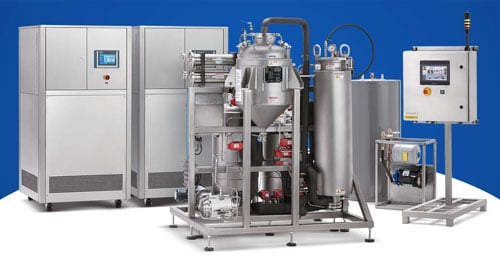Discover the essential equipment and benefits of using Luna Technologies for BHO cannabis extraction.
Exploring BHO Cannabis Extraction Equipment: Your Questions Answered
Delta 8 THC vs Delta 9: Understanding the Differences
Discover the key differences between Delta-8 THC and Delta-9 THC, and how they affect the body and mind.
How SAFER Banking Act Transforming Cannabis Business Finances?
Discover how the introduction of the SAFER Banking Act could revolutionize the way financial institutions serve state-approved cannabis businesses, potentially creating a safer and more secure environment for the industry.
Understanding various Challenges In The Solventless Extraction Method
A Guide To Solventless Extracts
Revered by many for its ability to produce clean, terpene-rich, and full-spectrum concentrates, solventless extraction stands in contrast to more traditional solvent-based techniques that employ butane, propane, ethanol, or CO2.
Whether you’re an entrepreneurial technician with a passion for purity or an investor seeking the next breakthrough, it's crucial for anyone currently contemplating entering the extraction industry to understand the various nuances of solventless cannabis concentrates. While the promise of an environmentally friendly and 'true-to-plant' concentrate certainly sounds enticing, the path to scaling and commercializing these kinds of operations can be fraught with all sorts of challenges that many might not initially anticipate.
Automating Cannabis Extraction: A Game-Changer for Entrepreneurs
Discover how automation is revolutionizing the cannabis extraction industry and providing entrepreneurs with unprecedented opportunities for growth and success.
Don't Miss Out MJBizCon 2023 Cannabis Business Conference
Prepare for the ultimate cannabis business conference, MJBizCon 2023, in Las Vegas from Wednesday, November 29 to Friday, December 1. Get ready to immerse yourself in learning, networking, and exploration as you delve into the latest trends shaping the cannabis industry. And remember, we will be there too, waiting to greet you with our show specials and equipment onsite. See us at Booth 3826 (shared with Huber Chillers) or our Booth 4147. And don't sleep on Wednesday night party... get your tickets today!
Becoming a Cannabis Extraction Technician: A Step-by-Step Guide
Discover the step-by-step process of becoming a skilled cannabis extraction technician in this comprehensive guide.
Separating Fact from Fiction: Cannabis Hydrocarbon Extraction Myths
Discover the truth behind common misconceptions surrounding cannabis hydrocarbon extraction, also known as BHO extraction, and gain a deeper understanding of the process.
Unlocking the Power: Psilocybin Extraction Methods
Discover the various methods used to extract psilocybin and unlock its potential for therapeutic use.
Decoding Distillation: Simple vs Fractional
Discover the critical differences between simple and fractional distillation, and learn how each process is used in various industries.


